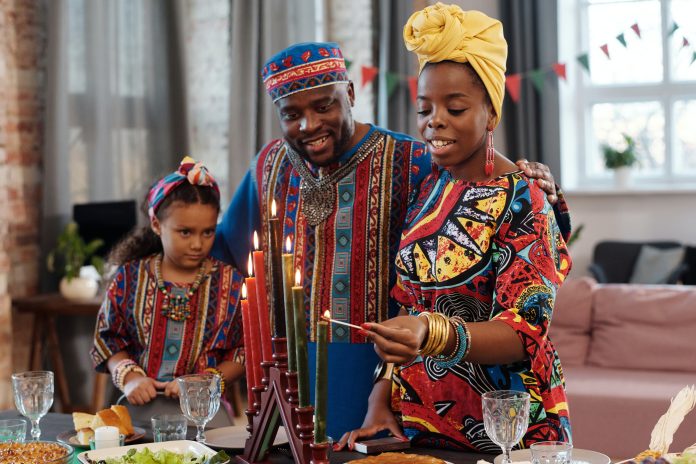
By Jitahadi Imara, Special to the AFRO from the Amsterdam News
One of the many attractive aspects of Kwanzaa, the African American holiday celebrated December 26th through January 1st, is its spiritual feature. Although Kwanzaa is not a religious holiday, it nevertheless has a spiritual dimension. One of the many attractive aspects of Kwanzaa, the African American holiday celebrated December 26th through January 1st, is its spiritual feature. Although Kwanzaa is not a religious holiday, it nevertheless has a spiritual appeal. Spirituality, is defined here broadly speaking as the highest values which humans aspire to attain, is expressed in the values, concepts and themes of Kwanzaa.
As a value-based holiday, Kwanzaa draws from the “First Fruits” celebrations in traditional African societies. In these societies, at the end of the year, the community came together to give thanks for a healthy and prosperous life, the well-being of the family and to honor the accomplishments of the community and to make a commitment to practicing the life affirming values and the Way of the community. These concepts and values which have been rationally adapted to fit the needs of modern day African Americans form the basis of the Kwanzaa holiday.
Thus, today’s modern interpretation of the First Fruit celebration is translated as celebrating the health, beauty and achievement of the family and community. Therefore:
– Giving thanks for the healthy and prosperous life and the well-being of the family and community is expressed in the faith-based community as prayer and worship and in the secular community as service to others and improving the quality of life.
– Celebrating and honoring the accomplishments of family and community translates into recognizing and honoring children’s’ (school performance and good behavior), honoring the work of parents (It takes a Village to raise a child), and celebrating the achievements of the community (collective accomplishment of everyone).
– Paying homage to the ancestors today means remembering and honoring those who have enriched of the lives of the family and community members- parents; sisters, brothers; grandparents; uncles; aunts; and significant others- friends, and historical figures such as Frederick Douglass; Harriet Tubman; WEB DuBois; Ida B. Wells-Barnett; George Washington Carver; Mary McLeod Bethune; James Weldon Johnson; Carter G. Woodson; Rosa Parks; Marcus Garvey; Ella Baker; Malcolm X; Martin Luther King, Jr and many others.
– Commitment to practicing the life affirming values and the Way of the community now means practicing the Seven Principles- Unity, Self-determination, Collective work and Responsibility, Cooperative Economics, Purpose, Creativity, and Faith.
To be sure, the concepts, values and practices of Kwanzaa speaks to the inner urging and nature of humans to love, share, unite, care, hope, believe, create, aspire, and pursue a higher purpose in life. The principles Unity and Collective Work and Responsibility encourages that all humanity unite, and that we all must look out for each other (we are our brother’s and sister’s keepers).
The principles Faith and Shared Wealth instruct Kwanzaa celebrants and practitioners to believe and trust in each other. Faith urges that we see beyond the immediate and believe in something larger than ourselves. Howard Thurman, philosopher and educator, teaches that faith is the spirit which makes “tired hearts refreshed and dead hopes stir with the nearness of life; that faith is the “promise of tomorrow at the close of everyday, the triumph of life in the defiance of death, and the assurance that love is sturdier than hate, right is more confident than wrong, that good is more permanent than evil.”
The principles Purpose and Creativity demand that we link ourselves to a higher calling and vocation, and that through our work and service, we leave our families, communities, nation and the world a much better place to live. Martin Luther King, Jr reminds us that “An individual has not started to live until he or she can rise above the narrow confines of his or her individualistic concerns to the broader concerns of humanity”, and that service is what helps us to attain greatness, therefore “everybody can be great because anyone can serve, is required is “a heart full of grace; a soul generated by love.”
In short, the daily ritual Kwanzaa activities- family gathering, reverence for the creation, candle lighting, and celebration of the common- gives the Kwanzaa celebration a spiritual intimacy which transcends the normal day-to-to interactions of family and community members.
Jitahadi Imara is the CEO of the Kwanzaa Guide. His experience and expertise on Kwanzaa spans four decades and includes the writing and producing of the number one selling DVD on Kwanzaa in America. Mr. Imara has been featured in the Los Angeles Times, Stevie Wonder’s radio station, KJLH, Orange County Black Chamber of Commerce, and the American Library Association. He studied with the creator of Kwanzaa, Maulana Karenga, for over eleven years and is in frequent demand as a lecturer and workshop presenter on Kwanzaa.
More information can be obtained on Kwanzaa by going to http://www.kwanzaaguide.com.

